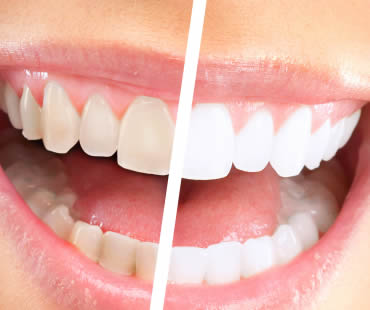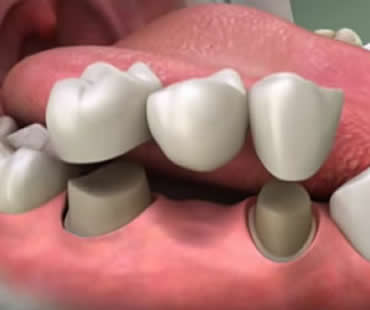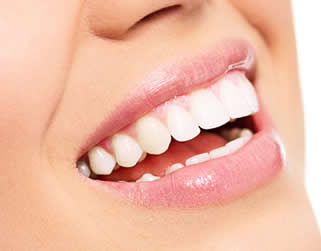
by Dr. Adkins | Sep 7, 2017 | Blog, Dental Topics, Uncategorized
Dental veneers are thin, wafer-like shells that are placed directly on top of your natural tooth to treat problems like gapped, misaligned, discolored, or worn down teeth. Indirect veneers are made by a technician in a dental laboratory while direct veneers are formed directly onto your tooth by your dentist. Most often, dental veneers are made from either porcelain or composite resin.
If your problems include discolored, cracked, chipped, stained, gapped, or misaligned teeth, your dentist might suggest porcelain veneers as your best option. Smaller dental issues like minor cracks, chips or spots of discoloration are more suitable for direct veneers with composite resin.
To adhere either type of veneers to your teeth, a small amount of your natural tooth surface must be removed. This process is permanent, meaning you will always need a veneer to restore the form and function of your tooth. For this reason, many dentists will try other types of treatments or restorations to correct your dental problems before turning to veneers.
If you wish to avoid altering too much of your tooth enamel, “no prep” veneers may be another option to consider. This type of veneer requires considerably less of the natural tooth to be modified. Only the surface enamel is affected, rather than the dentin of the tooth underneath the enamel layer.
Dental veneers should last for at least ten years, and may last as long as twenty years with proper care. Either type of dental veneer will improve the function of your mouth and enhance the look of your smile. Consult with your dentist about the types of veneers available to restore your beautiful smile.
If you live in the McDonough area, contact us today

by Dr. Adkins | Aug 14, 2017 | Blog, Dental Topics, Uncategorized
More and more people today are heading to their dentist’s office to brighten their smiles through teeth whitening treatments. Although you can try to maintain white teeth by limiting foods and drinks that stain or stopping habits like smoking, the truth is that teeth are prone to discoloring over time. If you’re considering undergoing teeth whitening, get the facts before you go.
Is teeth whitening safe?
Most people are able to have their teeth whitened successfully without any issues. However, not everyone has good enough oral health to safely undergo treatment. Healthy teeth and gums are necessary so that the procedure is comfortable and effective. Patients with extensive fillings or crowns may not be the best candidates. Teeth that have extremely dark stains or discolorations from certain things like medications may not attain desired results.
How do I know if I’m a good candidate?
A complete oral examination by your licensed dentist is the best way to determine if teeth whitening is right for you. During the assessment, your dentist will look for decay, receding gum lines, fillings, enamel condition, tooth sensitivity and more to decide if treatment is advised. Sometimes dental work can be done to restore oral health and then whitening becomes an option.
What is the process?
Most professional teeth whitening treatments performed in a dental office are done with a high concentration peroxide bleaching agent and enhanced with special lighting to activate the gel. The dentist usually coats your gums with a product to limit sensitivity, and then the bleaching gel is carefully placed onto your teeth. Light is directed to the area, typically in three 15-minutes sessions. The dentist monitors the entire process for your safety and comfort.
What results can I expect?
It is important to discuss your specific case with your dentist prior to treatment so that you have realistic whitening goals in mind. The degree of whitening often depends on the level and cause of your tooth discoloration. Some patients achieve a couple of shades brighter, while others whiten up to ten shades.
We treat patients from McDonough and the surrounding area

by Dr. Adkins | Jul 7, 2017 | Blog, Dental Topics, Uncategorized
If you’re looking to improve both your oral health and your smile, a dental crown or a bridge may be recommended. They both improve the functionality and appearance of teeth, providing many health and cosmetic benefits to patients.
What are crowns?
These are basically caps that are placed over existing teeth. They restore the size, shape and strength of your tooth and make it look natural and appealing in your smile. Crowns can be made of various materials including ceramic, resin, plastic, stainless steel or metal alloys. A combination of materials may even be used to achieve ideal strength and appearance.
When are crowns recommended?
There are a number of reasons that dentists install crowns. They may protect a weak tooth, save a cracked tooth, restore a worn or broken tooth, hide a badly discolored or crooked tooth, hold a bridge, cover an implant, or aid in completing a cosmetic dental procedure.
What does the crown procedure involve?
A crown installation typically requires three dental visits. Initially, the dentist examines the tooth to advise the best material. On the second visit, the tooth is prepared and an impression is made for creating the crown in a dental lab, and a temporary crown is placed. The final visit involves replacing the temporary crown with the final one.
What are bridges?
These restorations consist of two crowns that are joined together by a tooth. Bridges replace missing teeth by relying on adjacent teeth for support. They are made out of the same types of materials as crowns.
When are bridges recommended?
Bridges are most often a solution for replacing a few teeth, especially on just one side of the mouth. They are only successful when neighboring teeth are strong and offer excellent bone support.
What is the bridge procedure?
While two crowns and a missing tooth are fabricated in a dental lab, teeth adjacent to the gap are trimmed and prepared for crowns. When the restoration is ready, the pieces will be joined in the mouth to create a bridge to be held in place by the crowns on both sides of the artificial tooth.
We treat patients from McDonough and the surrounding area

by Dr. Adkins | May 18, 2017 | Blog, Dental Topics, Uncategorized
Are you looking for quick and noticeable results in brightening your smile? You’ve probably heard about visiting a dental professional for teeth whitening, but you might not have realized that often the procedure is performed using laser technology.
Laser teeth whitening is considered to be the wave of the future for transforming smiles from dull to beautiful in only an hour. Most patients can expect their teeth to lighten somewhere between 5 and 10 shades. Approved by the FDA in 1996, it is a popular service that many dentists offer.
Lasers were introduced as a method for teeth whitening in response to patient dissatisfaction with traditional bleaching methods, which can produce pain and inflammation. Some patients find bleaching too uncomfortable to withstand in an effort to brighten their smiles. Instead, lasers focus on a very precise area so that side effects common to other methods may be avoided.
Another appealing characteristic to laser whitening is that it speeds up the process. Most other methods take a couple of weeks up to months to achieve desired results, while laser whitening is performed in a single office visit. Dramatic results are possible in just one hour. A portion of that time doesn’t even involve the use of lasers, but taking time to protect the soft tissues of the mouth to avoid potential side effects.
The most common type of laser technology used for teeth whitening is the argon laser. Chemicals are placed on the teeth and then laser light is administered to enhance the chemical reaction and color change. After whitening, the dentist usually treats the teeth with fluoride to provide a brighter shine and strengthen the teeth.
After laser teeth whitening, it’s up to the patient to help ensure long-lasting results. Avoiding common items that stain teeth, such as coffee, soda, tobacco, dark sauces and more is advised. Some dentists provide a take-home kit including a customized tray and special gel to help maintain the new whiter smile. Laser whitening is a process that many patients rave about because of the minimal hassles and outstanding results.
If you need a dentist in McDonough, contact us today

by Dr. Adkins | May 18, 2017 | Blog, Dental Topics, Uncategorized
Dental implants have become the standard of care recommended by dentists for replacing missing or damaged teeth. Compared to other solutions, many patients are finding that dental implants give them a reason to smile.
Realism
Dental implants provide a new tooth and root that looks, fits, functions, and feel like a natural tooth. Implants avoid the potential problems associated with some alternatives, such as trouble eating, speaking or laughing.
Durability
Dental implants can last a lifetime with proper care, making them outlast most of their counterparts which have a lifespan of up to 10 years.
Natural
Patients are able to retain their natural face shape. Missing teeth can make a person’s face look sunken and saggy, but implants allow you to maintain your proper face shape and smile.
Protective
Missing teeth may cause jaw bone deterioration or loss, but implants preserve and stimulate the natural bone. The jaw is able to maintain its strength and firmness, protecting your bone structure. Also, neighboring teeth are not affected by dental implants. Healthy adjacent teeth are not damaged and stay exactly where they should be.
Health
Cavities can’t take hold in a dental implant and crown. Proper hygiene and regular checkups should continue to ensure your mouth is healthy, but that particular tooth will not decay.
Confidence
Dental implants erase the patient’s embarrassment about their smile and give them the confidence to enjoy life again. No more worries about a big space in the smile, and no concerns that the restoration will loosen or fall out like may happen with dentures.
Convenience
There are no hassles for the patient to alter their diet because implants allow natural biting and chewing. Favorite foods can still be enjoyed with this restoration.
Simplicity
No need to remove the implants overnight for cleaning because they are permanently installed. They are a permanent solution inside the jaw and mouth.
If you live in the McDonough area, contact us today







 770-957-5214
770-957-5214  E-Mail Us
E-Mail Us 
